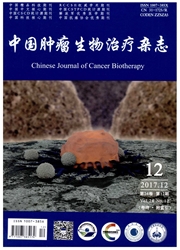

 中文摘要:
中文摘要:
目的:鉴定抑制肺癌细胞生长的功能性单克隆抗体1E2及其抗原,为治疗肺癌提供有潜力的靶向抗体治疗剂和分子靶位。方法:采用活细胞荧光、MTT细胞增殖实验、ELISA、动物体内治疗实验等方法检测鼠单克隆抗体1E2对人肺癌细胞增殖的抑制、单抗与癌细胞的结合部位、单抗的亚类和单抗对肺癌移植瘤的抑制,以Western blotting和MALDITOF质谱方法鉴定该功能性单抗的抗原。结果:单抗1E2能够与肺癌细胞GLC82和NCI-H520的细胞膜结合,在体外能够明显抑制肺癌细胞的增殖。动物实验表明单抗1E2能够抑制肺癌移植瘤的生长,抑制率达49%。Western blotting显示其抗原相对分子质量约110000,质谱鉴定该抗原为氨甲酰磷酸合成酶(carbamoyl-phosphate synthetase1,CPS1)。结论:单抗1E2能够在体内外抑制肺癌的生长,具有成为肺癌靶向治疗剂的潜力。该抗体识别的抗原CPS1可表达于肺癌细胞的细胞膜,可能是一个肺癌靶向治疗的新靶位。
 英文摘要:
英文摘要:
Objective: To identify a functional monoclonal antibody 1E2 against lung cancer and its antigen, so as to provide a candidate antibody drug and molecule target for the anti-lung cancer therapy. Methods: The inhibition of the lung cancer cells, binding with tumor cells, isotypes, and inhibition of implanted tumor growth of 1 E2 monoclonal antibody were studied by immunofluorescence, ELISA, cell proliferation assay, and in vivo tumor treatment experiments. The corresponding antigen of 1 E2 was identified by Western blotting and MALDI-TOF mass spectrometry. Results: The 1 E2 antibody could recognize cell surface protein of lung cancer cell line GLC82 and HCI-H520 and obviously inhibited the lung cancer cell growth in vivo. Animal experiment revealed that 1 E2 antibody significantly inhibited lung tumor growth by 49%. Western blotting revealed that the molecular weight of the antigen of 1 E2 antibody was about 110 000. Mass fingerprint revealed this protein was carbamoyl-phosphate synthetase 1 ( CPS1 ). Conclusion: 1 E2 monoclonal antibody can suppress lung tumor growth in vitro and in vivo; it might become a candidate drug for targeted lung cancer treatment. CPS1, the antigen of 1E2, locates on the membrane of lung cancer cells and it may become a novel molecule target for lung caner therapy.
 同期刊论文项目
同期刊论文项目
 同项目期刊论文
同项目期刊论文
 期刊信息
期刊信息
